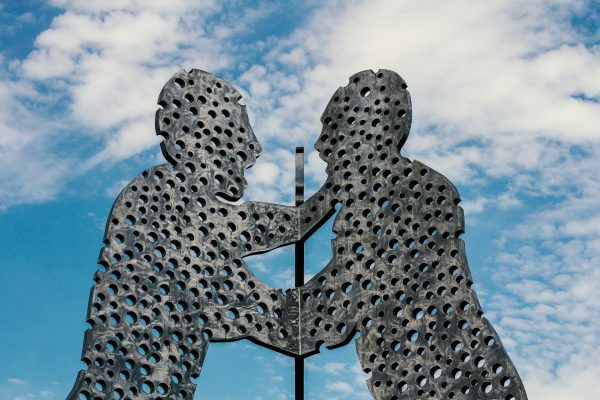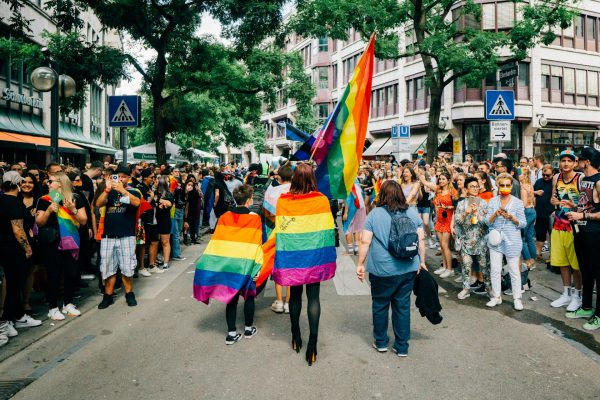By some miracle, Falsettos, a musical about 1979-1981 that premiered in 1992, is potentially more political and poignant in this 2016 revival than it was originally. This musical, by William Finn and James Lapine, tells the story of the original “modern family:” Marvin has left his wife, Trina, for his boyfriend, Whizzer, but wants to keep his son, Jason in his life. He sends his ex-wife to a therapist, Mendel, who she falls in love with and marries. Of course lets also not forget the lesbians next door, Cordelia and Charlotte. The piece grapples with sexuality, the constrictive norms about family life, domesticity, sexism, homophobia, and in the final act, the AIDS crisis.
Seemingly, the show is very dated. It takes place quite clearly in 1979-1981, amidst the AIDS crisis and at a time when a “modern family” was scandalous, not a popular TV show. When Falsettos premiered in 1992, the themes were still topical, the AIDS crisis was still destroying a community, and more and more men and women were leaving their straight marriages to be in queer relationships. James Lapine directed the original production (which won several Tony awards) and is once again directing the piece, this time at the Walter Kerr Theatre in a completely new style, stage, cast, and context. Rarely are original productions and revivals directed by the same person, but here Lapine has proved that a director really can re-imagine a piece and have it mean something quite different.
Although this production was mounted before Donald Trump’s election, it is hard to watch the musical and not feel the weight it has inherited. In a country where our president-elect, his vice president, and his cabinet/transition team/advisers are blatantly anti-LGBTQIA+, a musical about homophobia all of a sudden no longer feels like a funny period piece about the 1980s. Shockingly, the AIDS crisis feels less far away. The discrimination that Marvin, Whizzer, Cordelia, and Charlotte face feels more real. Everyone referring to Whizzer as “Marvin’s friend,” a euphemism that erases queer romance, no longer feels dated but feels like a term that may be forced back into the common vocabulary. In a country where we have gotten very used to seeing same-sex relationships onstage, on television, and in the movies, the radical nature of a scene with two men in a bed is no longer radical. However, with a new political regime on the rise, it is easy to feel that Falsettos is challenging the incoming wave of homophobia, boldly stating that queer people will not go into hiding again.
The cast brilliantly handles this political weight, bringing new life to a fun, emotional, deep musical. The show stars Christian Borle as Marvin, Stephanie J. Block as his wife Trina, Brandon Uranowitz as the therapist Mendel, Andrew Rannells as his boyfriend Whizzer, Anthony Rosenthal as his son Jason, and Tracie Thomas and Betsy Wolfe as the lesbians Cordelia and Charlotte. That’s the whole cast; no ensemble, no chorus, no dancers. The musical is sung through and is noticeably small. At times the small size of the work is incongruous with the very large stage and the somewhat odd sets by David Rockwell. However, the actors somehow manage, almost never leaving the stage and making the audience feel how intimate of a show this is.

Particular praise needs to be given to Stephanie J. Block and Andrew Rannells, who both performed their very complicated roles with nuance, comedy, vocal power, and depth. Block as the misunderstood, lonely, tired, and anxious wife Trina completely stole the show for Act I, receiving an almost standing ovation for “I’m Breaking Down” in which she sings through a panic attack while chopping up dinner, ending by belting an impressive not for seemingly forever while eating a banana at the same time. Later, in her ballad, she sings “I’m tired of all the happy men who rule the world” which inspired so much angry applause and passionate cheers from the audience that Block and the orchestra had to pause the song. Block proved herself to be a vocal powerhouse while also bringing the audience to tears, proving that although it is a good thing that Marvin embraced his sexuality, is has left the loving Trinia alone and tired.
Andrew Rannells, Broadway’s pretty (Mormon) boy, took on a slightly different part than usual. Instead of being typecast into the pretty dancing flamboyant character, he took and a more nuanced, but still pretty gay boy, role. Whizzer can’t decide if he loves Marvin, does not want to be monogamous, forms a deep connection with the young Jason, and eventually dies from a mysterious illness we know to be AIDS. Although Rannells most of Act I flipping his hair, removing his shirt, and being gorgeous, in Act II he steals the spotlight from Block and becomes the emotional center of the show, gracefully dying while bringing the entire audience to tears. In the final stages of the show, Whizzer realizes that he does love Marvin, but only once he understands that they have no future together.
Although Christian Borle plays Marvin, the lead, he never stole the show. He often fell into patterns of brooding and in a modern context his demands that his wife (and late Whizzer) stay home and cook dinner seem problematic–not to mention when he receives his ex-wife and ex-therapist’s wedding invitation and responds by slapping Trina across the face. However, both the character and the actor are not devoid of sympathy, and both become particularly charming for two memorable songs in Act II. The first, “What More Can I Say?” is a monologue Marvin sings while in bed with the sleeping Whizzer, remarking how lucky he is to have found love. Marvin ends the show with the song “What Would I Do?” which occurs after Whizzer’s death. Marvin sings “What would I do if I had not met you? How would I blame my life on? What would I do if I had not loved you? How would I know what love is?”
I saw the show on Wednesday, November 9th, the day after the election. As the show ended and the lights faded to black, the entire audience was audibly crying and sniffling. As the curtain rose and the actors came about the bow, the entire cast was sobbing. For everyone, the musical meant so much more than expected. It became more emotional, more relevant, more political. In an unscripted post-bow moment, Rannells said to the audience, “We love telling this story every night, but we loved telling it tonight especially.” Go see Falsettos, go cry about the perilous state of queer politics in our country, go and support a play that is imploring–just as it did twenty years ago–for the world pay attention to queer issues and be accepting of “modern families.”






